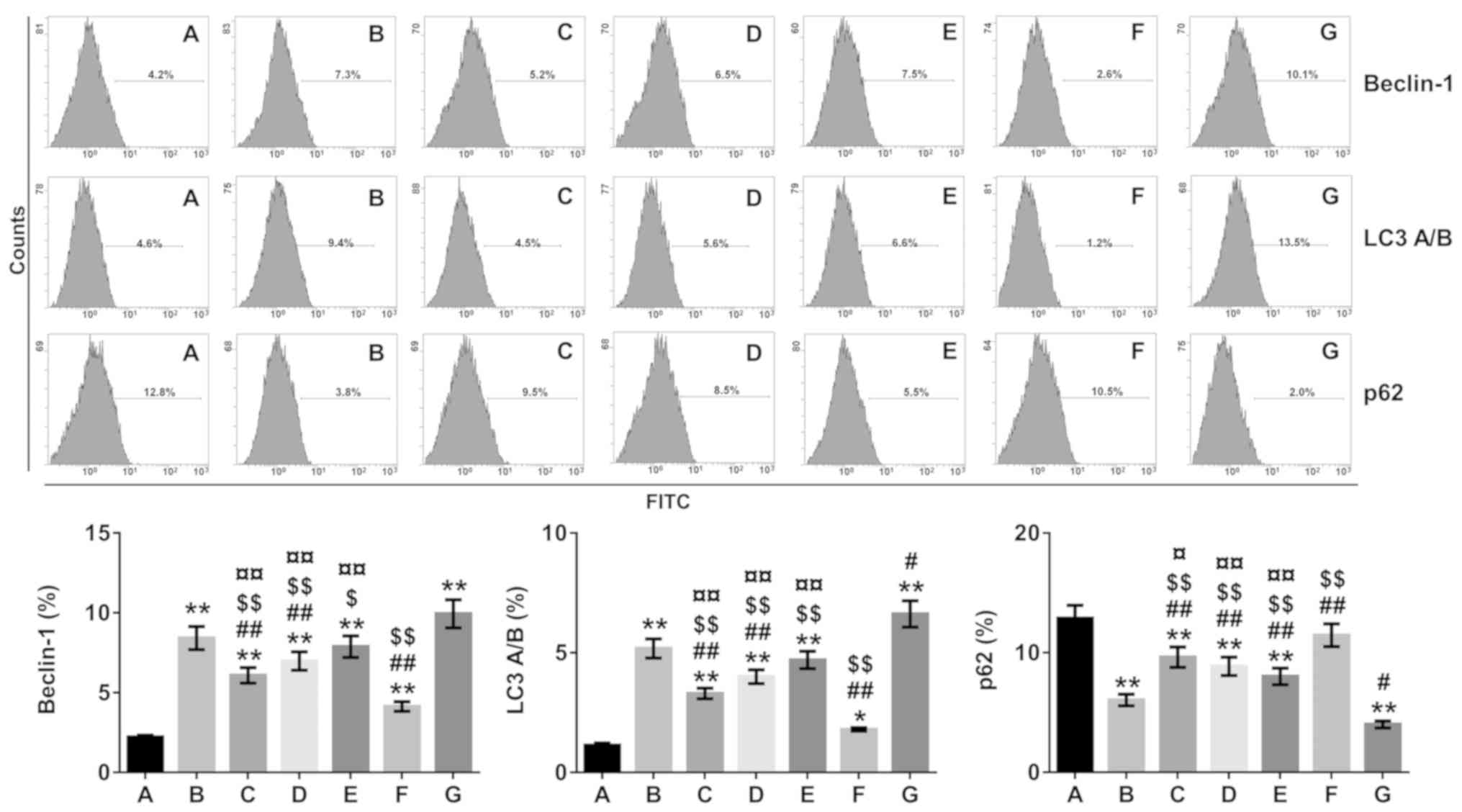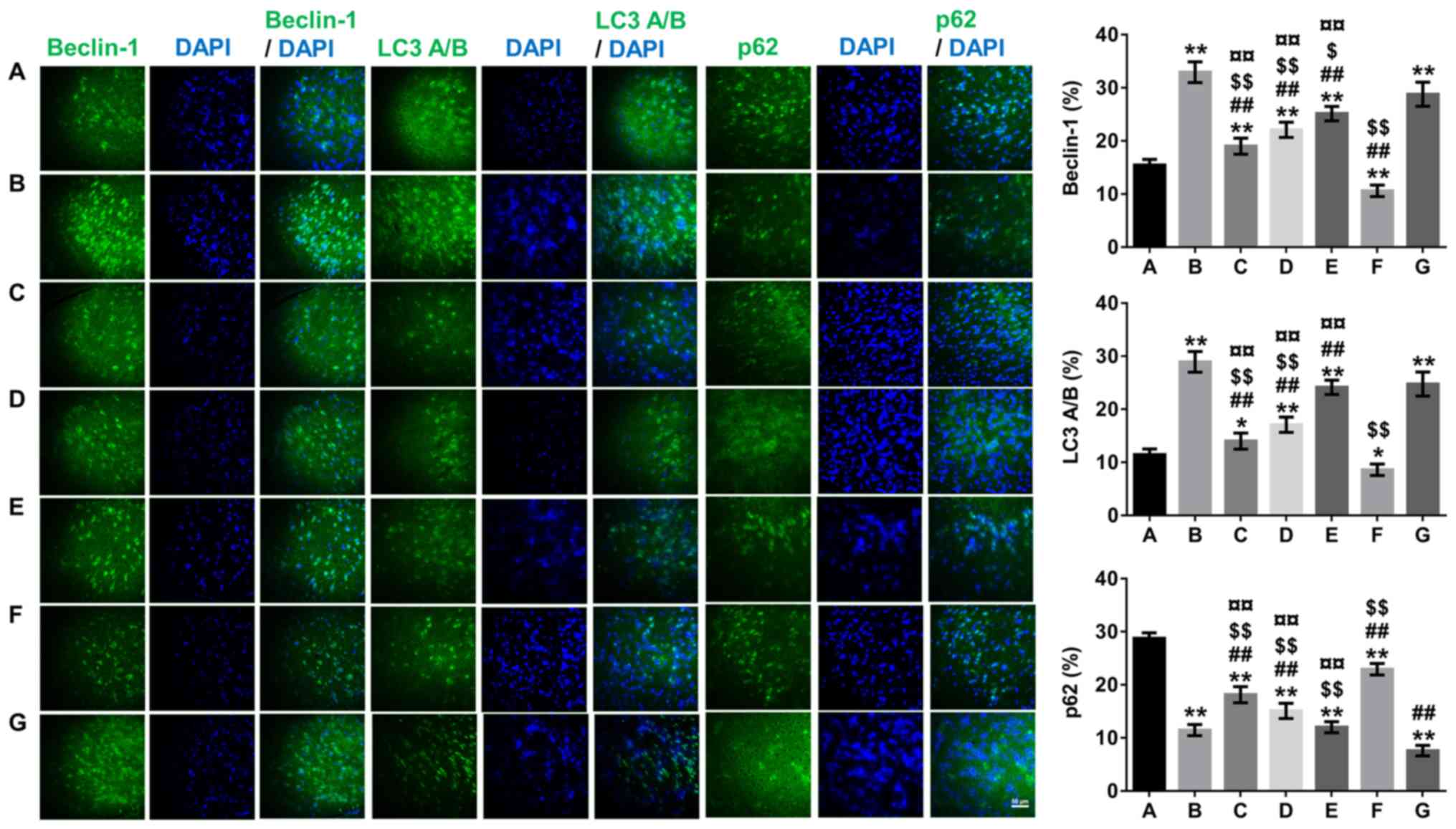|
1
|
Selkoe D, Mandelkow E and Holtzman D:
Deciphering Alzheimer disease. Cold Spring Harb Perspect Med.
2:a0114602012. View Article : Google Scholar : PubMed/NCBI
|
|
2
|
Gouras GK, Almeida CG and Takahashi RH:
Intraneuronal Abeta accumulation and origin of plaques in
Alzheimer's disease. Neurobiol Aging. 26:1235–1244. 2005.
View Article : Google Scholar : PubMed/NCBI
|
|
3
|
Whitehouse IJ, Brown D, Baybutt H, Diack
AB, Kellett KA, Piccardo P, Manson JC and Hooper NM: Ablation of
prion protein in wild type human amyloid precursor protein (APP)
transgenic mice does not alter the proteolysis of APP, levels of
amyloid-β or pathologic phenotype. PLoS One. 11:e01591192016.
View Article : Google Scholar : PubMed/NCBI
|
|
4
|
Oczypok EA, Oury TD and Chu CT: It's a
cell-eat-cell world: Autophagy and phagocytosis. Am J Pathol.
182:612–622. 2013. View Article : Google Scholar : PubMed/NCBI
|
|
5
|
Han K, Kim J and Choi M: Autophagy
mediates phase transitions from cell death to life. Heliyon.
1:e000272015. View Article : Google Scholar : PubMed/NCBI
|
|
6
|
Salminen A, Kaarniranta K, Kauppinen A,
Ojala J, Haapasalo A, Soininen H and Hiltunen M: Impaired autophagy
and APP processing in Alzheimer's disease: The potential role of
Beclin 1 interactome. Prog Neurobiol. 106-107:33–54. 2013.
View Article : Google Scholar : PubMed/NCBI
|
|
7
|
Gali CC, Fanaee-Danesh E, Zandl-Lang M,
Albrecher NM, Tam-Amersdorfer C, Stracke A, Sachdev V, Reichmann F,
Sun Y, Avdili A, et al: Amyloid-beta impairs insulin signaling by
accelerating autophagy-lysosomal degradation of LRP-1 and IR-β in
blood-brain barrier endothelial cells in vitro and in 3XTg-AD mice.
Mol Cell Neurosci. 99:1033902019. View Article : Google Scholar : PubMed/NCBI
|
|
8
|
Lauritzen I, Pardossi-Piquard R, Bourgeois
A, Pagnotta S, Biferi MG, Barkats M, Lacor P, Klein W, Bauer C and
Checler F: Intraneuronal aggregation of the β-CTF fragment of APP
(C99) induces Aβ-independent lysosomal-autophagic pathology. Acta
Neuropathol. 132:257–276. 2016. View Article : Google Scholar : PubMed/NCBI
|
|
9
|
Hertel C, Terzi E, Hauser N, Jakob-Rotne
R, Seelig J and Kemp JA: Inhibition of the electrostatic
interaction between beta-amyloid peptide and membranes prevents
beta-amyloid-induced toxicity. Proc Natl Acad Sci USA.
94:9412–9416. 1997. View Article : Google Scholar : PubMed/NCBI
|
|
10
|
Zhang Y, Liu C, Wang J, Li Q, Ping H, Gao
S and Wang P: MiR-299-5p regulates apoptosis through autophagy in
neurons and ameliorates cognitive capacity in APPswe/PS1dE9 mice.
Sci Rep. 6:245662016. View Article : Google Scholar : PubMed/NCBI
|
|
11
|
Huang L, Deng M, He Y, Lu S, Ma R and Fang
Y: β-asarone and levodopa co-administration increase striatal
dopamine level in 6-hydroxydopamine induced rats by modulating
P-glycoprotein and tight junction proteins at the blood-brain
barrier and promoting levodopa into the brain. Clin Exp Pharmacol
Physiol. 43:634–643. 2016. View Article : Google Scholar : PubMed/NCBI
|
|
12
|
Lim HW, Kumar H, Kim BW, More SV, Kim IW,
Park JI, Park SY, Kim SK and Choi DK: β-Asarone
(cis-2,4,5-trimethoxy-1-allyl phenyl), attenuates pro-inflammatory
mediators by inhibiting NF-κB signaling and the JNK pathway in LPS
activated BV-2 microglia cells. Food Chem Toxicol. 72:265–272.
2014. View Article : Google Scholar : PubMed/NCBI
|
|
13
|
Dong H, Gao Z, Rong H, Jin M and Zhang X:
β-asarone reverses chronic unpredictable mild stress-induced
depression-like behavior and promotes hippocampal neurogenesis in
rats. Molecules. 19:5634–5649. 2014. View Article : Google Scholar : PubMed/NCBI
|
|
14
|
Zhang QS, Wang ZH, Zhang JL, Duan YL, Li
GF and Zheng DL: Beta-asarone protects against MPTP-induced
Parkinson's disease via regulating long non-coding RNA MALAT1 and
inhibiting α-synuclein protein expression. Biomed Pharmacother.
83:153–159. 2016. View Article : Google Scholar : PubMed/NCBI
|
|
15
|
Chang W and Teng J: β-asarone prevents
Aβ25-35-induced inflammatory responses and autophagy in SH-SY5Y
cells: Down expression Beclin-1, LC3B and up expression Bcl-2. Int
J Clin Exp Med. 8:20658–20663. 2015.PubMed/NCBI
|
|
16
|
Xue Z, Guo Y, Zhang S, Huang L, He Y, Fang
R and Fang Y: Beta-asarone attenuates amyloid beta-induced
autophagy via Akt/mTOR pathway in PC12 cells. Eur J Pharmacol.
741:195–204. 2014. View Article : Google Scholar : PubMed/NCBI
|
|
17
|
Liu L, Fang YQ, Xue ZF, He YP, Fang RM and
Li L: Beta-asarone attenuates ischemia-reperfusion-induced
autophagy in rat brains via modulating JNK, p-JNK, Bcl-2 and Beclin
1. Eur J Pharmacol. 680:34–40. 2012. View Article : Google Scholar : PubMed/NCBI
|
|
18
|
Hsiao K, Chapman P, Nilsen S, Eckman C,
Harigaya Y, Younkin S, Yang F and Cole G: Correlative memory
deficits, Abeta elevation, and amyloid plaques in transgenic mice.
Science. 274:99–102. 1996. View Article : Google Scholar : PubMed/NCBI
|
|
19
|
Liu L and Fang YQ: Analysis of the
distribution of β-asarone in rat hippocampus, brainstem, cortex and
cerebellum with gas chromatography-mass spectrometry (GC-MS). J Med
Plants Res. 5:1728–1734. 2011.
|
|
20
|
Livak KJ and Schmittgen TD: Analysis of
relative gene expression data using real-time quantitative PCR and
the 2(-Delta Delta C(T)) method. Methods. 25:402–408. 2001.
View Article : Google Scholar : PubMed/NCBI
|
|
21
|
Huang LP, Deng MZ, He YP and Fang YQ:
β-asarone and levodopa co-administration protects against
6-hydroxydopamine-induced damage in parkinsonian rat mesencephalon
by regulating autophagy: Down-expression Beclin-1 and light chain
3B and up-expression P62. Clin Exp Pharmacol Physiol. 42:269–277.
2015. View Article : Google Scholar : PubMed/NCBI
|
|
22
|
He Y, Mo Z, Xue Z and Fang Y: Establish a
flow cytometric method for quantitative detection of Beclin-1
expression. Cytotechnology. 65:481–489. 2013. View Article : Google Scholar : PubMed/NCBI
|
|
23
|
Bonham LW, Desikan RS and Yokoyama JS;
Alzheimer's Disease Neuroimaging Initiative, : The relationship
between complement factor C3, APOE ε4, amyloid and tau in
Alzheimer's disease. Acta Neuropathol Commun. 4:652016. View Article : Google Scholar : PubMed/NCBI
|
|
24
|
Abad S, Ramon C, Pubill D, Camarasa J,
Camins A and Escubedo E: Adolescent exposure to MDMA induces
dopaminergic toxicity in substantia nigra and potentiates the
amyloid plaque deposition in the striatum of APPswe/PS1dE9 mice.
Biochim Biophys Acta. 1862:1815–1826. 2016. View Article : Google Scholar : PubMed/NCBI
|
|
25
|
Gautam V, D'Avanzo C, Berezovska O, Tanzi
RE and Kovacs DM: Synaptotagmins interact with APP and promote Aβ
generation. Mol Neurodegener. 10:312015. View Article : Google Scholar : PubMed/NCBI
|
|
26
|
Schmitz KJ, Ademi C, Bertram S, Schmid KW
and Baba HA: Prognostic relevance of autophagy-related markers LC3,
p62/sequestosome 1, Beclin-1 and ULK1 in colorectal cancer patients
with respect to KRAS mutational status. World J Surg Oncol.
14:1892016. View Article : Google Scholar : PubMed/NCBI
|
|
27
|
Pattingre S, Espert L, Biard-Piechaczyk M
and Codogno P: Regulation of macroautophagy by mTOR and Beclin 1
complexes. Biochimie. 90:313–323. 2008. View Article : Google Scholar : PubMed/NCBI
|
|
28
|
O'Brien CE and Wyss-Coray T: Sorting
through the roles of beclin 1 in microglia and neurodegeneration. J
Neuroimmune Pharmacol. 9:285–292. 2014. View Article : Google Scholar : PubMed/NCBI
|
|
29
|
Bel S, Pendse M, Wang Y, Li Y, Ruhn KA,
Hassell B, Leal T, Winter SE, Xavier RJ and Hooper LV: Paneth cells
secrete lysozyme via secretory autophagy during bacterial infection
of the intestine. Science. 357:1047–1052. 2017. View Article : Google Scholar : PubMed/NCBI
|
|
30
|
Choi J, Jung W and Koo JS: Expression of
autophagy-related markers beclin-1, light chain 3A, light chain 3B
and p62 according to the molecular subtype of breast cancer.
Histopathology. 62:275–286. 2013. View Article : Google Scholar : PubMed/NCBI
|
|
31
|
Huang H, Zhu J, Li Y, Zhang L, Gu J, Xie
Q, Jin H, Che X, Li J, Huang C, et al: Upregulation of SQSTM1/p62
contributes to nickel-induced malignant transformation of human
bronchial epithelial cells. Autophagy. 12:1687–1703. 2016.
View Article : Google Scholar : PubMed/NCBI
|
|
32
|
Kwon I, Lee Y, Cosio-Lima LM, Cho JY and
Yeom DC: Effects of long-term resistance exercise training on
autophagy in rat skeletal muscle of chloroquine-induced sporadic
inclusion body myositis. J Exerc Nutrition Biochem. 19:225–234.
2015. View Article : Google Scholar : PubMed/NCBI
|
|
33
|
Wei X, Zhou Z, Li L, Gu J, Wang C, Xu F,
Dong Q and Zhou X: Intrathecal injection of 3-methyladenine reduces
neuronal damage and promotes functional recovery via autophagy
attenuation after spinal cord ischemia/reperfusion injury in rats.
Biol Pharm Bull. 39:665–673. 2016. View Article : Google Scholar : PubMed/NCBI
|
|
34
|
Li Y, Liu F, Wang Y, Li D, Guo F, Xu L,
Zeng Z, Zhong X and Qian K: Rapamycin-induced autophagy sensitizes
A549 cells to radiation associated with DNA damage repair
inhibition. Thorac Cancer. 7:379–386. 2016. View Article : Google Scholar : PubMed/NCBI
|



















